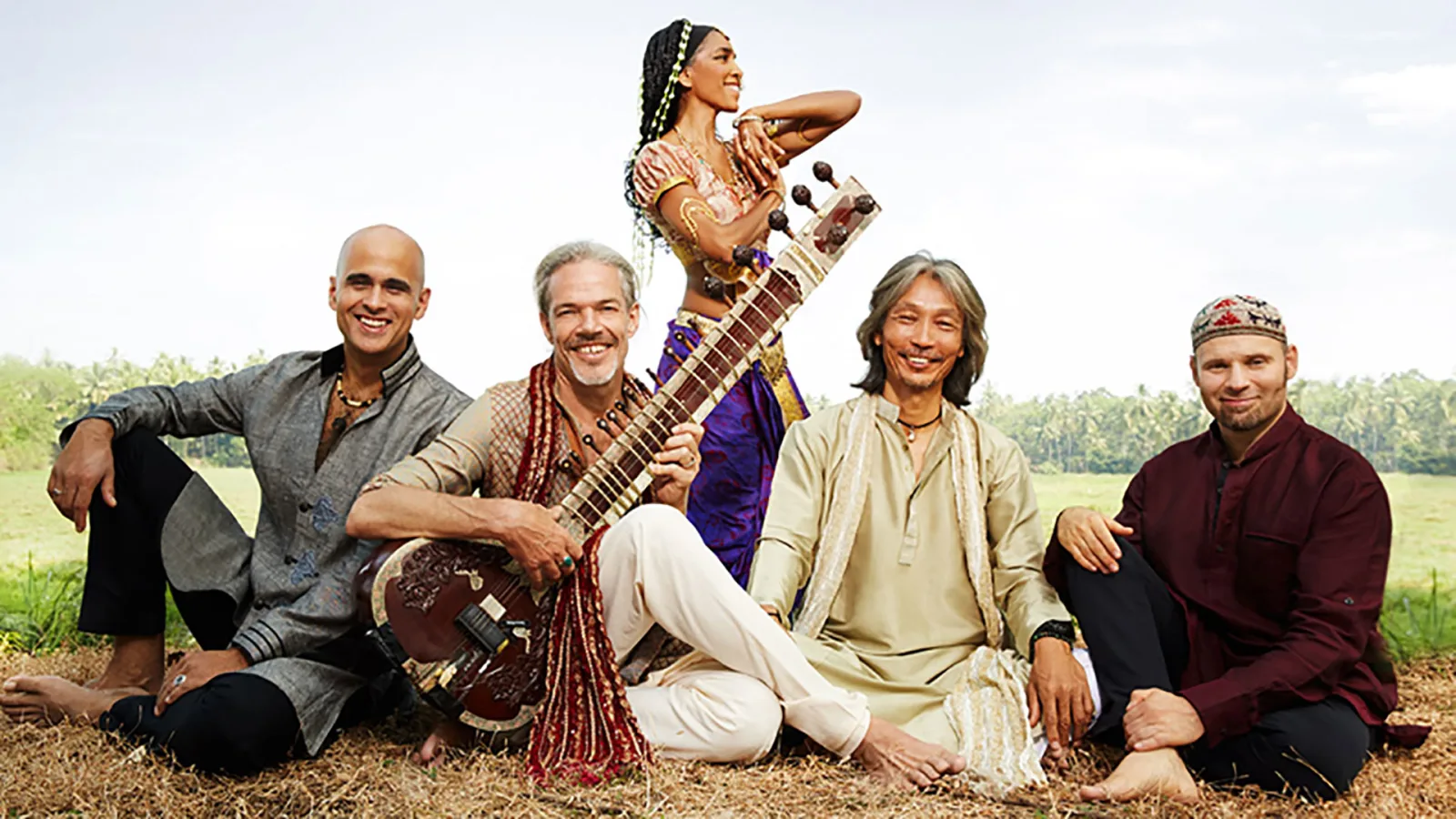
World Music Pioneer Prem Joshua: Music Is My Practice
In the last 20 years, world music pioneer Prem Joshua has performed outside a temple in Pushkar, on MTV in Mumbai, for the Prime Minister of India, at Glastonbury Festival, and for Prince Edward at the Royal Palace in London. Today, the German-born musician (pictured above with his band, holding a sitar) is one of the highest-selling world music artists in India.
A multifaceted composer and performer, Prem Joshua studied Indian classical music with sitar maestro Ustad Usman Khan and other well-known teachers before reinventing himself as an East-West fusion artist. Equally at home in the clubs of New York City and on stage in Delhi, he sings and plays the sitar, bamboo flutes, and soprano sax.
Just before he left for his next concert tour in India, Prem Joshua agreed to chat with Yoga International about his new album, KASHI: Songs from the India Within, his thoughts on music as a spiritual practice, and why he won’t talk about his guru.
What’s unique about your new album, If you’re familiar with my music, you know that it’s often on the instrumental side. But KASHI revolves around songs. My colleague, Chintan Relenberg, who is a producer and used to be a member of my band, challenged me to create surprising new compositions of really famous mantras and shlokas. I was hesitant at first, but I decided to accept the challenge, and I must admit, we had a lot of fun.
What messages are you trying to get across in these songs? Some of the songs are based on shlokas, pulled from the Upanishads and other texts, which refer to female energies. I loved using this as a theme, because this world is so male-dominated, and we all need more feminine energies in order to survive.
The song “All Roads Lead to Om” draws its prayer from one of the oldest Vedic texts, but the message is as relevant today as ever. In a world where fanaticism and ignorance seem to be taking hold ever more strongly, this prayer shines like a beacon, guiding our journey along the “road to Om.”
In one of your interviews, you said, “As Westerners, sometimes we take in these mantras and shlokas undigested and out of context and fuse them in the music, and this isn’t right. We really need to appreciate and understand them.” How did you come to a better understanding and appreciation of the mantras and shlokas that you chose for so that you could bring more depth and meaning to the songs? Well, I have a deep connection with India. I have been going there for the last 35 years, and I have been living there for 17. My understanding of the devotional side of India has evolved over time.
But it’s complicated, because in some ways, India has turned into one of the most materialistic countries in the world. When you visit the big cities and you talk to the people who are living there, it seems like everybody just wants to make money. Everyone wants a car, a nice apartment. Nobody talks about spirituality, devotion, or meditation. They talk about their families and how they can get richer.
But still, there is an undercurrent flowing—an old, authentic wisdom from the saints and sages. There is a long tradition of searching for, and exploring, the inner world. Many Westerners come to India for that purpose. That’s why I subtitled this album Songs from the India Within. Because this hidden India lies within us all, whether we’re Indian or not.
What does the word mean? It’s an ancient name for the holy city of Varanasi, also known as Benares. But another meaning is “abode of the soul.”
How many years did you spend with your guru, and what did you learn from him? A lot of people think that when you have a guru, you want to act like a missionary and shout it from the rooftops. I have no desire to do that. I spent many years with my spiritual master. He has helped me a lot through whatever I could experience in his presence. But for me, this is very precious, and therefore very private. A lot of people who don't have a spiritual master misunderstand the whole teacher-student relationship.
That’s true. There’s this naïve or distorted idea of “guru worship” in the West, but many people have no idea what it means to devote yourself to a guru. And then there are the people who are completely against the idea of having a guru. Since there is no such phenomenon in Western thinking, they may end up spreading lies and misconceptions, because they think they understand what it means to have a guru, but they don’t.
Does music play a role in your spiritual practice? For me, music is my sadhana. And anyone who has a sadhana—a way of diving in—understands why it becomes so important to make time for it in your life. When you begin to reap the benefits, you want to do your practice even more.
You have said that music brings you to a state of meditation or silence. Yes, although I try to avoid using those words these days. Music has a tremendous, transforming energy. It’s a healing force. When I play, when I sing, when I practice my instruments, it just settles, satisfies, and nourishes me. I feel a simple happiness.
I think that music is a medium to find your inner self.
For more information on Prem Joshua and his five-member fusion band, visit his website or listen to a free track from KASHI .